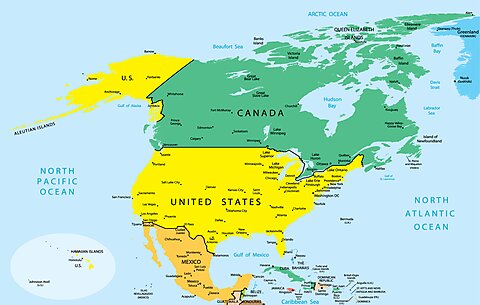Alfredo Carrillo Obregon and Scott Lincicome
On March 6, President Donald Trump exempted Canadian and Mexican imports that enter the US free of duty under the US-Mexico-Canada Agreement (USMCA) from the 25 percent tariffs implemented under the International Emergency Economic Powers Act (IEEPA) until April 2. At first glance, the announcement might seem like a big, positive move to restore free trade in North America and finally acknowledge its benefits for US companies and consumers. In reality, however, the exemption provides a temporary reprieve for only a fraction of Canadian and Mexican imports and will thus not remedy much of the tariffs’ economic damage, their legal vulnerabilities, or the political dysfunction they’ve fomented in Washington.
Many Products Remain Subject to Punitive Tariffs
As the White House has acknowledged, a significant share of Canadian and Mexican imports do not enter the United States under the USMCA and thus remain subject to Trump’s new 25 percent (or, in the case of Canadian energy and potash, 10 percent) tariffs. The agreement sets almost all US tariff rates on Canadian and Mexican imports to zero. But more than half of all Canadian and Mexican imports enter the United States without importers claiming preferential (i.e., duty-free treatment) under USMCA (Figure 1). Instead, those goods enter subject to the standard US “most-favored nation” (MFN) tariff rate, which for many items is either zero or so low as to not warrant the time/effort needed to demonstrate USMCA compliance.
It is highly unlikely that these goods will suddenly start entering the United States under the USMCA over the next month, meaning they will remain subject to Trump’s new tariffs. Where MFN rates are zero, in fact, it’s likely impossible for importers to “comply” with USMCA because no “special” rate of duty exists in the US tariff code (HTSUS). Here, for example, is how the HTSUS handles coffee (note the blanks in the “Special” column where a preferential tariff rate code would go):
As a result, nearly 40 percent of US imports from Canada and Mexico in 2024, valued at $363.7 billion and accounting for huge shares of US total imports of certain products (Figure 2), simply can’t meet Trump’s new tariff exclusion as it’s currently written.
For most of the remaining goods entering the United States outside of USMCA, quick compliance is also unlikely. Companies have chosen to pay the MFN-based tariff amount because it’s cheaper than the cost of certifying their goods as “originating” in North America (and thus qualifying under USMCA) or adjusting their supply chains to adhere to the agreement’s sector-specific rules of origin. As the Office of the US Trade Representative noted in a 2024 report, for example, the burden of complying with the USMCA’s complex rules of origin for auto parts has caused a growing share of auto parts imports to enter the United States under the MFN tariff rate (Figure 3).
We should expect few companies to incur these costs—assuming they even can—for only a one-month reprieve from Trump’s tariffs.
Uncertainty Persists
The new tariff exemptions also will do nothing to mitigate the uncertainty that Trump’s tariffs have created in the North American market. Most obviously, few if any companies will make major changes to their business operations with only a one-month reprieve from punishing tariffs and no assurances as to what will apply thereafter. President Trump has also promised additional tariffs—on steel and aluminum, on “reciprocal” terms, on cars and semiconductors, and so on—in the coming days and remains steadfast in his support for using tariffs to achieve various economic and geopolitical ends.
The mandatory six-year review of USMCA in July 2026 further compounds these concerns. It’s thus no surprise that various measures of US trade policy uncertainty have skyrocketed in recent weeks—reaching levels far higher than those set during Trump’s first term, which has since been found to have depressed US business investment by tens of billions of dollars (Figure 4).
We should expect similar harms this time around, and the stock market’s continued selloff—even right after the tariff exemption was announced on March 6—indicates that most investors agree.
Other Problems Persist
Economics aside, the exemptions also raise important domestic and international legal questions. By exempting only imports that enter the United States under USMCA preferential treatment from the 25 percent tariffs, the Trump administration has undermined its own reasons for implementing the tariffs—a supposed “national emergency” related to cross-border fentanyl smuggling. Indeed, given the way the exemption was conceived and modified over 24 hours—applying first to USMCA-compliant auto imports, then to all imports from Mexico only, then to imports from Mexico and Canada—it’s laughable to suggest that the president’s unprecedented invocation of the International Emergency Economic Powers Act was anything other than a pretext to unlock vast tariff powers that the president could use for protectionist, not security, objectives. By leaving the tariffs in place for all other imports, moreover, the administration has effectively overwritten the US MFN tariff rate that Congress set for all goods, at least with respect for those coming from Mexico and Canada, and that is part of the United States’ World Trade Organization (WTO) commitments.
Finally, the exemptions are sure to foster further political dysfunction as the administration’s tariff actions continue to be rolled out. As has been reported, the initial exemption announcement came after politically powerful US automakers spoke directly to President Trump about the harms the tariffs would have on their business operations. The potash exemption, meanwhile, came after furious lobbying by US farm groups and their friends in Congress. Both episodes send a strong signal to “The Swamp” that preferential trade treatment can be obtained if you know the right people in the US government, thus encouraging more lobbying and cronyism in the weeks ahead.












